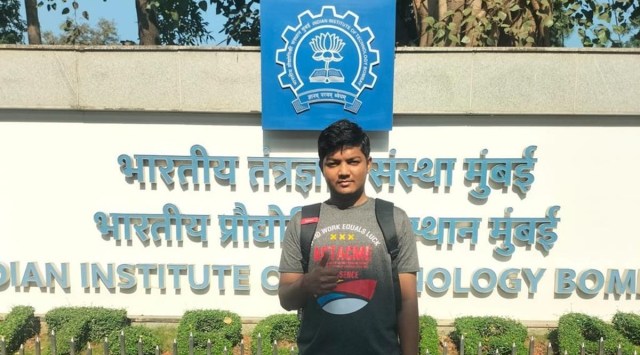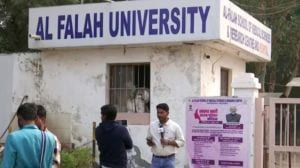55 statements, 473 pages: Chargesheet pieces together Darshan’s life at IIT-Bombay from October to February
The chargesheet quotes witnesses claiming they had seen Khatri and Darshan engaged in a conversation days before the suicide. Khatri was seen crying during the conversation. On February 10, Darshan sent text messages to Khatri to apologise for a communal remark but Khatri never replied to these texts
 Darshan Solanki died by suicide on February 12, a day after his semester exams got over. (Twitter/@ambedkariteIND)
Darshan Solanki died by suicide on February 12, a day after his semester exams got over. (Twitter/@ambedkariteIND) Besides evidence in the abetment of suicide, over 55 statements in the 473-page chargesheet by Mumbai Police show glimpses of the life of 18-year-old Darshan Solanki as a student at IIT-Bombay between October 2022 to February 2023. Darshan died by suicide on campus around 1 pm on February 12.
The statements — by Darshan’s parents and sister, fellow students, professors and assistant professors — help piece together the criminal case, Darshan’s life on campus, the challenges he faced as a member of a Scheduled Caste community and his last few days, during which he allegedly got into a tiff with a fellow student. The police have claimed in the chargesheet that it was a series of incidents — which started in the beginning of February — between fellow student Arman Khatri and Darshan that led the latter to jump from the refuge floor of the students’ hostel on February 12.
The chargesheet, filed on Tuesday, names Khatri as the only accused. He is booked under charges of abetment of suicide, criminal intimidation of the Indian Penal Code (IPC) and under relevant Sections of the Scheduled Castes and Scheduled Tribes (Prevention of Atrocities) Act. The chargesheet quotes Darshan’s family members as saying that he had, during his regular phone calls with them, spoken about the environment at the institute and the caste discrimination practiced by his fellow students. His father, Ramesh Solanki, has been seeking a probe into this aspect, expressing dissatisfaction at this being buried under the “guise of investigation”.
Academic record and a paper cutter
The chargesheet also includes Darshan’s academic record. Statements by fellow students claim that he lost interest in studies after a poor performance in his mid-semester exams and was even contemplating quitting IIT-Bombay to join a private college. However, his sister’s statement says Darshan had told her that he would continue to focus on his studies despite the struggles and complete his education at the institute.
The police claim that Darshan had made a communal remark — around February 9 — that had hurt Khatri’s feelings. The chargesheet does not have specific details about the exact date or time or the nature of this remark.
 Darshan Solanki, originally from Ahmedabad, allegedly jumped off the eighth floor of his hostel building on the IIT Bombay campus in Powai on February 12. (Express Photo)
Darshan Solanki, originally from Ahmedabad, allegedly jumped off the eighth floor of his hostel building on the IIT Bombay campus in Powai on February 12. (Express Photo)
On February 10, Darshan sent text messages to Khatri, apologising to him. He told Khatri that he was leaving the institute and the city. Witness statements by fellow students claim that Darshan had also later hugged Khatri and said that he was leaving the city. As per the police, Khatri did not reply to these texts sent by Darshan. Witnesses, however, told the police that Darshan had informed them that Khatri had said even if Darshan were to leave the city, he would find him and not let him get away. This scared Darshan and on February 11, he even developed a fever.
The police also quote witnesses to show that on February 10, while he was walking for an exam, Darshan had asked Khatri about the contents of his bag. Khatri told him that he had a pen, a book and a paper cutter. When asked why he was carrying a paper cutter, Khatri allegedly said that he wanted to get even with someone. Witnesses said Darshan had become nervous after his interaction with Khatri. His friends had tried to explain to him that anyone would feel bad if one were to make a communal comment and told him not to worry, the chargesheet claimed.
The police also alleged that a paper cutter was recovered from Khatri, which he had used to intimidate Darshan. The police also have quoted witnesses claiming that they had seen Khatri and Darshan engaged in a conversation — days before the suicide — where Khatri was seen crying. When asked why, they both had not responded. Later, Darshan told his roommate and another friend that he felt Khatri’s tears were fake.
However, on the day of Darshan’s suicide, as mentioned in the statements, Khatri, Darshan and others went for breakfast. Later, Khatri and others hung out in Darshan’s room and played a game that his roommate had installed on his laptop. The main evidence that the police claim to have against Khatri, based on which he was arrested, is a handwritten note found in Darshan’s room on March 3, nearly three weeks after his death.
The note was found by the Special Investigation Team (SIT) of Mumbai Police, which took over the probe from the Powai police. While the Powai police had conducted a search of Darshan’s room, it was claimed that the note was not found then. The note, written behind an examination question paper, states, “Arman has killed me”. The veracity of the note was questioned by Khatri through his lawyer, while seeking bail. Darshan’s father too disputed the genuineness of the note. The chargesheet includes an analysis by forensic experts, who have said that it matches the samples of Darshan’s handwriting in his answer sheets. While granting bail to Khatri on May 6, the Special Court had said that mere allegations in a suicide note are not sufficient to conclude that he had abetted the suicide.
For Darshan’s family, Khatri’s arrest has left more questions than answers. In a letter to the SIT on April 12, three days after Khatri’s arrest, Ramesh said he had learnt from media reports that the probe agency was ruling out caste discrimination faced by Darshan in light of the note naming one student. Ramesh sought for the police to investigate the fact that Darshan had felt isolated and ostracised due to his caste. On this aspect, the chargesheet mainly relies on statements by Darshan’s family.
Scholarship form and social interactions
According to statements by his family, Darshan had to fill up a scholarship form in December and was worried about his friends finding out about his caste. His sister said she had told him to seek guidance from other students belonging to Scheduled Castes. A few days later, he called her up again to say that he had spoken to some seniors and that they had told him not to mention his caste anywhere or he would face ragging and mental stress like them. His sister’s statement also mentions that Darshan had told her about frequent discussions among his fellow students on the scholarship given to students belonging to oppressed castes. He said the students would taunt him about students belonging to the Scheduled Castes getting “free education” and even questioned the need for it.
The family’s statements do not mention any specific person related to allegations of caste discrimination. Due to this, the SIT officials said they have not been able to gather any evidence on these allegations. The only specific mention by Darshan’s family is that of his roommate. The family claims Darshan had told them that after some friends found out about his caste, they, including his roommate, began avoiding him.
The chargesheet also includes the statement of the roommate as well as others staying on the same floor who interacted with Darshan on a daily basis. His roommate told the police that when he joined the institute in October, he only knew Darshan and one other friend. As his social circle expanded, he began interacting with many others. Another witness told the police that Darshan was not very social and that his roommate included him in all activities, including outings with friends to a mall, a trek, the college fest and other such social interactions. The students had even planned a two-day Mumbai sightseeing trip, which was scheduled to begin on the day of Darshan’s suicide. The statement also mentioned the roommate’s insistence on Darshan attending classes and visiting library, claiming that he had been too dejected to attend classes after the drop in his marks.
Statements of Darshan’s friends leave out any mention of caste. A student whose statement was not recorded by the police, but an excerpt submitted by a students group at the institute, states that Darshan had met him twice in November and mentioned that his roommate had cut down on talking to him after finding out about his rank. The student told Darshan that many students faced the same issue and advised him to make other friends or he would face loneliness and study pressure.
The last interaction
During the last interaction Darshan had with his roommate at 12 pm on February 12, an hour before his suicide, the former complimented him on his looks. At 12.20 pm, Darshan spoke to his family and told them that once he returned home after two days, he wanted a get-together with all the relatives. Darshan was last seen on the refuge floor, from where he jumped about 40 minutes after the call.
IIT-Bombay internal committee’s interim report, submitted on March 2, had ruled out caste discrimination. It had said that it had no information on what happened in the time after Darshan’s call to his family and before the tragic incident. The chargesheet too fails to throw light on the sequence of events that took place in these 40 minutes.







